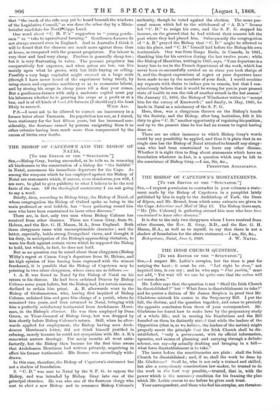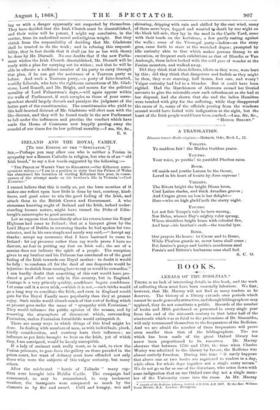THE IRISH CHURCH QUESTION.
[To THE EDITOR OF THE "SPECTATOR."] SIR,—I respect Mr. Loftie's scruples, but the time is past for untying the knot ; it must be cut. "Lot right be done," not inquired into, is our cry ; and he who says "Fiat justitia," must not add, "Yet wait till we can be quite sure that the ceelum will nut come down."
Mr. Loftie says that the question is not "Shall the Irish Church be disestablished ?" but "What form is disestablisliment to take?" and he quotes a dictum of Sir James Stephen in proof that Mr. Gladstone mistook his course in the Suspensory Bill. I put the bill, the dictum, and the question together, and come to precisely the opposite conclusion from those of your correspondent. Mr. Gladstone has learnt how to make laws by the preparatory study of a whole life ; and in moving his Resolutions and the Bill founded on them be distinctly stated that while the leaders of the Opposition (that is, as we believe, the leaders of the nation) might properly assert the principle that the Irish Church shall be dis- established, "only a government, with its official information, agencies, and means of planning and carrying through a definite scheme, can say—by actually drafting and bringing in a bill— what form disestablishment is to take."
The issues before the constituencies are plain : shall the Irish Church be disestablished ; and, if so, shall the work be done by Mr. Gladstone? Shall he, who is not only a trained and skilled, but also a scrupulously conscientious law-maker, be trusted to do the work in the best way possible,—trusted, that is, with the power which is the necessary condition for his framing the plan which Mr. Lof tie craves to see before he gives such trust.
Your correspondent, and those who feel his scruples, are threaten- ing us with a danger apparently not suspected by themselves. They have decided that the Irish Church must be disestablished, and their voice will be potent, I might say conclusive, in the matter, from its undoubted moral and religious weight. But they shrink from the responsibility of deciding that Mr. Gladstone shall be trusted to do the work ; and in refusing this responsi- bility, they in fact decide that it shall (as far as lies with them) be done by Mr. Disraeli. No one doubts that if the new Parlia- ment wishes the Irish Church disestablished, Mr. Disraeli will be ready with a plan for carrying out its wishes ; and that he will be able to educate a sufficient number of his party to carry through that plan, if he can get the assistance of a Tearoom party as before. And such a Tearoom party,—a party of false-hearted, worldly Liberals, who hate the righteous earnestness of Mr. Glad- stone, Lord Russell, and Mr. Bright, and mourn for the political morality of Lord Palmerston's days,—will again appear within the walls of Parliament, if such scruples as those of your corre- spondent should largely disturb and paralyze the judgment of the better part of the constituencies. The constituencies who yield to this half-hearted distrust of Mr. Gladstone will elect men with the like distrust, and they will be found ready in the new Parliament to fall under the influences and practise the conduct which have made the House of Commons now happily passing away the scandal of our times for its low political morality.—I am, Sir, &c., E. S.































 Previous page
Previous page